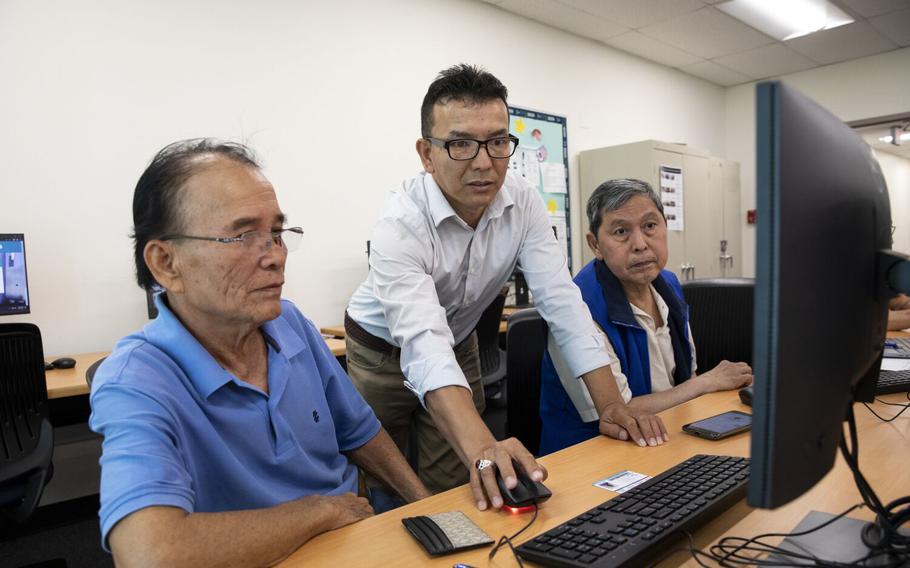
Zulfiqar Noori, center, helps Du Trang, left, and Thanh Vuong with registering for classes at San Diego College of Continuing Education on Thursday, July 20, 2023, in San Diego. Noori is from Afghanistan and resettled in San Diego. He is currently taking classes for cyber security. (Ana Ramirez, The San Diego Union-Tribune/TNS)
(Tribune News Service) — When Zulfiqar Noori goes for walks around his neighborhood of Normal Heights, the smiles and casual greetings from passersby remind him how grateful he feels to live in San Diego and in the United States.
Noori, 36 and a father of three girls, was one of thousands of Afghans evacuated during the withdrawal of U.S. troops in 2021. He knows that if his family had stayed at their home in Kabul, they would have been in constant danger.
"When you talk with Americans face-to-face, they smile," Noori said. "I love it."
Noori and his family are Hazara, an ethnic minority that faces discrimination and frequent attacks in Afghanistan, especially under Taliban rule. Noori worked in the Afghan military as a teacher of medical first aid, which would have made the family even more of a target.
Nearly two years after the withdrawal and evacuation effort, he's still waiting to find out the results of his asylum application.
But Noori and his family have already established new lives in San Diego, and he's found a way back to teaching. He credits the help of several volunteer groups with his success. That includes Mimi Pollack, a retired English-as-a-Second-Language teacher from San Diego College of Continuing Education.
When Pollack and other volunteers organized a book fair for Afghans at the hotel where Noori and his family were staying, he served as the event's translator. Pollack said she was so impressed, she suggested he apply for a teacher's aid position where she used to work in City Heights.
But Noori had his doubts. He worried about not understanding classroom culture in the United States. He didn't know what to expect.
"All refugees have this problem from the street up to the office," he said, recalling the challenge of learning how to navigate lights at intersections or stop a bus when he was ready to get off.
Pollack encouraged him to meet with the teachers and give it a try.
Noori found his footing back in the classroom. He saw his students from the Afghan military in his new students at the English classes. And he used the same tools — making sure to greet each student with a friendly smile and ask how they were doing. He's even learned bits of Spanish to check in on his Spanish-speaking students.
A few months later, he was promoted to a position that requires a higher level of English proficiency. Now he also helps students navigate technological hurdles for registering for courses and logging into online classes.
On Thursday, he sat in a computer lab with a woman from Afghanistan and helped her select her class for the fall semester. He'd already helped students from Somalia, China, Haiti and Mexico. Next, he turned his attention to a group of men from Vietnam. With each student, he patiently pointed the way through the computer programs that can seem daunting to new arrivals who don't have much experience with English or computers.
"This program would not function without Noori and the other assistants," said Jeff Strack, an ESL teacher who manages the program that employs Noori. "Noori is that welcoming, patient smile they see when they come in."
Beyond feeling safe and his dreams for his daughters to have access to education, Noori is grateful for the feeling of equality that living in the United States gives him. He said that in Afghanistan, higher education institutions often discriminated against Hazara people.
"Why I like America is if you try, you can go up to where you want," Noori said.
Noori's knowledge of English is growing as well. He's taking an English class at the campus where he works, and he is now in the highest level ESL class. He plans to start community college classes in cybersecurity this fall.
"Everything is good here in San Diego and America," he said. "It's too much better."
©2023 The San Diego Union-Tribune.
Visit sandiegouniontribune.com.
Distributed by Tribune Content Agency, LLC.